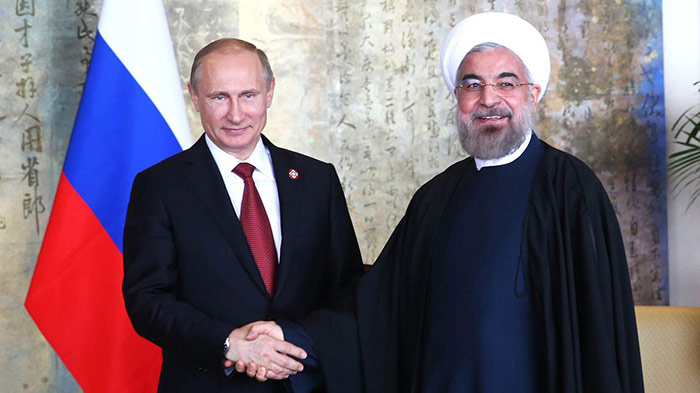Russia’s dilemma between Iran and Israel

Last week, Russia’s deputy foreign minister Mikhail Bogdanov said ties between Russia and Israel are at their best possible shape. In his interview with Iranian website "Didehban-e Russieh" (Russia Viewer), Nematollah Izadi, former ambassador to Soviet Union, begs to differ and says Moscow-Tel Aviv ties cannot be strategic.
IRD: What is the definition and significance of strategic ties between Iran and Russia? What indicators do they have?
NI: There is a clear distinction between strategic ties, and ties moving toward a strategic level. My definition of strategic ties is those mutual relations established that lead to total reciprocal support regarding domestic and international issues. In my opinion, this kind of relation is rarely established in today’s world, just as two individuals could hardly become supportive of each other in every respect. Examples of strategic ties are what exists between Israel and the US or between the UK and the US.
However, if an alliance takes shapes even temporarily in a certain situation, like what occurred among world power during the World War II against a common enemy, those relations could also find a strategic form. The longevity of strategic relations requires ideological and structural factors.
IRD: That said, do you consider Russo-Israeli ties strategic?
NI: Definitely not. There is no reason for their ties to be or become strategic. They have as much common interests as they have conflicts of interests. They cannot back each other when it comes to conflicts. Since Russia’s vision in the Middle East is naturally different from the United States’, Israel will naturally move toward US, if it is to move. Therefore, we cannot define Russo-Israeli ties as strategic.
IRD: Some believe that under the Rouhani administration, Tehran-Moscow ties have been upgraded to a strategic level. Where do you think these relations stand? How does Russia handle simultaneous cooperation with both Iran and Israel?
NI: Moscow-Tehran and Moscow-Tel Aviv ties are not quite comparable. Each could matter for Russia and secure its interests to a certain degree but they should not be viewed in the same light and by the same definition. Even Russia cannot make a final choice I believe. In some cases Russia would prefer Iran to Israel, whereas other circumstances may reverse its preference.
In my opinion, neither Russia’s relations with Iran nor its ties with Israel are strategic. However, both ties are significant for Russia due to regional issues and the two’s geographical locations. However, given the present state of affairs in the region, Russians will be more inclined towards Iran if they ever want to make a choice.
IRD: What course have Russo-Iranian ties taken under the Rouhani administration and what are the achievements?
The good thing about the ties in the past three years are firstly their stability, secondly a clearer definition of the existing issues and thirdly more commitment to these definitions on both sides. Both sides have tried to display this stability to each other and to the world. Visits made by foreign ministers and summits held, like the joint economic commission or the convention on the legal status of the Caspian Sea, have demonstrated mutual respect, stability and peace.
IRD: What are some of the criticisms against Russo-Iran ties?
NI: For now, there are no genuine criticisms since nothing extraordinary has happened in Iran-Russia ties. However, if Russo-Israel relations make remarkable breakthroughs, it will naturally cause a conflict of interests for us. The closer those ties becomes, the more concerned we will be. If we fail to manage the situation and reinforce our relations, it could threaten our situation.
In addition, if Russia reaches a compromise with the US on the Middle East and takes measures regarding the future of Syria and domestic wars (in a way that negatively affects our relations, convincing us to stop or downgrade ties with them), it could be alarming.
IRD: Figures show that trade balance between Russia and Iran dropped drastically during the first two years of the Rouhani administration. Then in the third year, officials suddenly started to speak of economic growth. In the meantime, Iran’s ambassador to Moscow told university students on December 6 that economic trade between the two countries is insignificant. How do you evaluate economic ties?
Quantity-wise, relations could decline, because the oil prices have decreased in recent years, weakening factors such as our purchasing power. Moreover, with the nuclear deal and the availability of various foreign partners, it is perfectly normal that Russia gets a smaller share. Thus, I am not concerned about this. It is not acceptable for us to try to maintain some figures at any cost. What matters is our ability to have economic ties with Russia and other countries whenever we want. We have this capacity with Russia at the moment. If we want to make a purchase or launch a project, we will not have too many problems and it is a good thing.
IRD: Regardless of political inclinations of the sitting government in Tehran, ties with Russia have always had a special significance for Iran. The Rouhani administration believes that these relations are currently at a ‘golden age’. What are the characteristics of this ‘golden stage’?
NI: Presuming that is a valid argument, it must have had these features: we have found relative stability. We are now able to understand, contact, and consult each other about regional issues. Thus, we can say we are in a good position. However, some political issues cannot be seen from a statistical lens. For instance, I believe that economic and political issues have overshadowed cultural ones. Additionally, there have been times when military cooperation was more intense. It is not necessary now. All in all, we can say the ties are in good shape and we should try to maintain the status quo.

